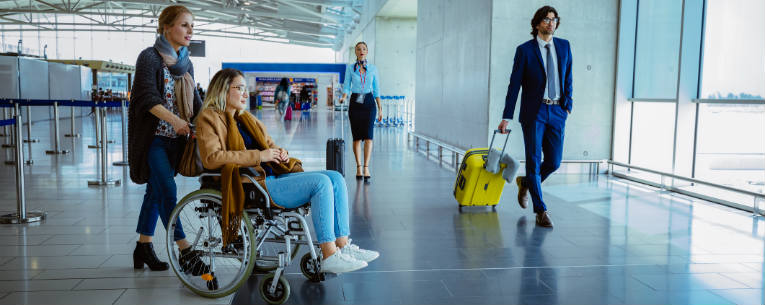Traveling with disabilities doesn’t necessarily mean you need to modify or cut back your itinerary to experience the ideal getaway. With more and more airlines, hotels and tourist attractions heavily investing in the necessary accommodations to make everyone feel welcome and comfortable, it’s easier than ever for travelers of all types of ability and mobility to enjoy a destination in much the same way.
With a little bit of extra planning and research, physical disabilities — both temporary and permanent conditions — don’t have to stand in the way of bucket lists or even last-minute travel plans. When traveling with disabilities, completing the due diligence before you go can help ensure a smooth trip.
1. Check with your physician
Before you book flights or make hotel reservations, double check with your doctor to make sure that traveling is advisable for your particular situation. Once you receive the “all clear,” you can work with your healthcare provider to put together a document with pertinent health information. Compile an overview of your medical history, current medications, necessary accommodations, and your doctor’s phone number. That way all of the information is in one place in case of an emergency.1
2. Replicate your routine
Traveling provides an opportunity to get out of your comfort zone and experience something new. But that doesn’t mean you should throw your day-to-day routine completely out the window. For example, if it takes you a while to get going in the mornings, don’t be overzealous with your itinerary. Instead, schedule tours and other experiences for later in the day. If you need frequent breaks to rest, plan for that, too. Vacation isn’t the time to try and eliminate the tactics that you use at home to help you feel your best.2
3. Plan ahead
Consider the accessibility of your destination. Before you finalize any travel plans, check with your airline and lodging to see how they can accommodate your specific physical disabilities. The Americans with Disabilities Act (ADA) requires U.S. airlines, hotels and cruise ships to make reasonable accommodations for travelers with disabilities.2 When it comes to private rentals (such as an Airbnb) there’s some gray area regarding ADA requirements. Be sure to ask your host before booking a private residence if the unit is accessible for someone traveling with disabilities.
If you’ll be traveling abroad, keep in mind that foreign lodging and transportation services aren’t necessarily held to ADA standards. Your best bet? Call every transportation service and hotel in advance to explain your unique situation. Be clear and specific about the accommodations that you will need during your travel and stay.
4. Enlist an expert
There are travel agents who specialize in booking trips for those traveling with disabilities. Look for an agent who has experience arranging travel for others with your specific requirements. The accommodations necessary for someone with a hearing impairment versus an individual with a physical disability are quite different, so you’ll want an agent with the appropriate expertise.2
Even if you’re the type who usually likes to see the sites on your own, it may be worth your while to arrange tours with a specialized guide. A local guide who works with travelers with physical limitations can maximize your experience by designing a tour that takes advantage of the available accommodations
5. Communicate
It’s ideal to call in advance to make any special arrangements. But sometimes, despite your best efforts, that might not be enough. You may find that when you get to your destination, the folks on staff haven’t been given any heads up about the accommodations your group will need. At every step of your travels, plan to over-communicate.
In the case of an airline, call in advance to make sure your purchased seats are suited to someone with your physical disability. You may need to explain your situation again at the ticket counter when you arrive. Before you board the plane, be sure you are in the right “wave” so that you can safely get to your seat. And again, once you’re on board, check with your flight attendant about an exit plan for once you land. Traveling with disabilities sometimes means that you need to be your own advocate to ensure that your travels go according to plan.2
6. Prepare for the worst
Before you go, you can register your trip with the U.S. government using the Smart Traveler Enrollment Program (STEP). It’s a free service that allows you to connect with the U.S. embassy or consulate closest to your destination. The U.S. embassy can then contact you in the event of an emergency, natural disaster and/or civil unrest. STEP can also allow your family and friends to contact you in case of a personal emergency at home.3
It’s important for all travelers to have a plan in place in case of illness or unexpected injury. Your health insurance likely won’t cover medical visits that occur while abroad. And in the event of a medical evaluation, emergency medical transportation can cost upward of $100,000 out of pocket. You can cover your bases by purchasing travel insurance from Allianz Partners. Travel insurance can provide benefits for covered emergency medical/dental care or medical transportation. You’ll also have access to our team 24/7; these are professionals who can connect you with an appropriate doctor wherever you are. Plus, travel insurance can reimburse you for eligible pre-paid, non-refundable payments if your trip gets interrupted or canceled due to a covered medical emergency. (And if you have a pre-existing condition, it doesn’t necessarily disqualify you from coverage.)
When it comes to traveling with disabilities, it’s always a good idea to prepare in advance. And just in case there’s an unforeseen snag—grab travel insurance as a backup plan.
Related Articles








Share this Page